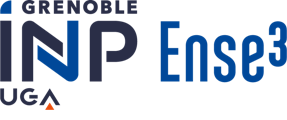
Informations générales
Number of hours
- Lectures 14.0
- Projects -
- Tutorials 6.0
- Internship -
- Laboratory works 38.0
ECTSECTS
5.0
Goal(s)
Know the principles implemented in commercial flow simulation codes for incompressible aerodynamics (essentially hydrodynamic) / conventional configurations.
Know the best practices for using these codes.
Awareness of the use of non-commercial codes through the simulation of compressible flows quasi-1D/2D.
Responsible(s)
Zhujun HUANG
Content(s)
Course and exercices:
• principles and implementation of the finite volume approach for the solution of Euler and Navier-Stokes compressible and incompressible operations
• Analysis Tools of discretization schemes: accuracy, stability, efficiency
Practical work:
• Validation & Verification process for non-viscous laminar and turbulent conventional aerodynamic flows, (only RANS approach) hydrodynamic / (single-phase flows, Newtonian fluid equations usual condition - constant density, ideal gas)
• analyzed configurations, linkages to postprocessing:flow over flat plate, cylinder, Profile, laminar and turbulent jets, incompressible pipe flow,
• openness to the coupling flow / thermal (natural convection)
Bases on partial differential equations resolution (course "Numerical Methods" of 1st Year)
Bases on Fluid Mechanics
Test
First session (If distant learning mandatory):
CC assessment: Exam of 1h30 for verifying the individual acquisition of key concepts and mastery of analysis (order of accuracy, stability, efficiency) tools.
ET assessment : Project Report: analysis independently, using a commercial CFD code, a non-treated BE but replicating the methodologies applied to cases dealt with in the training flow configuration.
Second session
ET assessement: New examination to replace the ET
CC assessment: Retaking this assessment is not possible
Moyenne de l'UE / Course Unit assessment = CC 50% + ET 50%
Calendar
The course exists in the following branches:
- Curriculum - Master's Degree in Engineering ME - Semester 7
Additional Information
Course ID : 4EUS3SF1
Course language(s): 
You can find this course among all other courses.
Bibliography
An introduction to computational fluid dynamics : the finite volume method, H. K. Versteeg and W. Malalasekera
Numerical heat transfer and fluid Flow, Suhas V. Patankar
The Finite Volume Method in Computational Fluid Dynamics: An Advanced Introduction with OpenFOAM® and Matlab, F. Moukalled, L. Mangani and M. Darwish
French State controlled diploma conferring a Master's degree



